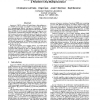Free Online Productivity Tools
i2Speak
i2Symbol
i2OCR
iTex2Img
iWeb2Print
iWeb2Shot
i2Type
iPdf2Split
iPdf2Merge
i2Bopomofo
i2Arabic
i2Style
i2Image
i2PDF
iLatex2Rtf
Sci2ools
134
click to vote
DSN
2007
IEEE
2007
IEEE
Utilizing Dynamically Coupled Cores to Form a Resilient Chip Multiprocessor
Aggressive CMOS scaling will make future chip multiprocessors (CMPs) increasingly susceptible to transient faults, hard errors, manufacturing defects, and process variations. Existing fault-tolerant CMP proposals that implement dual modular redundancy (DMR) do so by statically binding pairs of adjacent cores via dedicated communication channels and buffers. This can result in unnecessary power and performance losses in cases where one core is defective (in which case the entire DMR pair must be disabled), or when cores exhibit different frequency/leakage characteristics due to process variations (in which case the pair runs at the speed of the slowest core). Static DMR also hinders power density/thermal management, as DMR pairs running code with similar power/thermal characteristics are necessarily placed next to each other on the die. We present dynamic core coupling (DCC), an architectural technique that allows arbitrary CMP cores to verify each other’s execution while requiring n...
| Added | 02 Jun 2010 |
| Updated | 02 Jun 2010 |
| Type | Conference |
| Year | 2007 |
| Where | DSN |
| Authors | Christopher LaFrieda, Engin Ipek, José F. Martínez, Rajit Manohar |
Comments (0)

